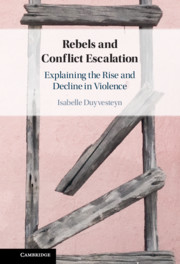Book contents
- Rebels and Conflict Escalation
- Rebels and Conflict Escalation
- Copyright page
- Dedication
- Contents
- Tables
- Vignettes
- Preface and Acknowledgements
- Abbreviations
- 1 Rebels and Escalation
- 2 Escalation and De-Escalation
- 3 Political Opportunity and Rebel Violence
- 4 Political Will
- 5 Capabilities
- 6 Capabilities
- 7 Political Will
- 8 Legitimacy and Support
- 9 De-Escalation
- 10 The Escalation and De-Escalation of Rebel Violence
- References
- Index
4 - Political Will
Provocation and Concession
Published online by Cambridge University Press: 01 July 2021
- Rebels and Conflict Escalation
- Rebels and Conflict Escalation
- Copyright page
- Dedication
- Contents
- Tables
- Vignettes
- Preface and Acknowledgements
- Abbreviations
- 1 Rebels and Escalation
- 2 Escalation and De-Escalation
- 3 Political Opportunity and Rebel Violence
- 4 Political Will
- 5 Capabilities
- 6 Capabilities
- 7 Political Will
- 8 Legitimacy and Support
- 9 De-Escalation
- 10 The Escalation and De-Escalation of Rebel Violence
- References
- Index
Summary
Chapter four looks at the development of the violent struggle and details the options the actors have available to deal with violent challenges. The causal mechanisms leading to escalation here focuses on a different set of shifts in saliency for the belligerents. The chapter shows that important escalatory potential can be found in the response of the state towards the sometimes only peaceful expression of opposition. The cases that are brought forward here are Northern Ireland and the Philippines in the 1970s, where escalation was triggered by the specific responses from the government.
- Type
- Chapter
- Information
- Rebels and Conflict EscalationExplaining the Rise and Decline in Violence, pp. 67 - 87Publisher: Cambridge University PressPrint publication year: 2021

